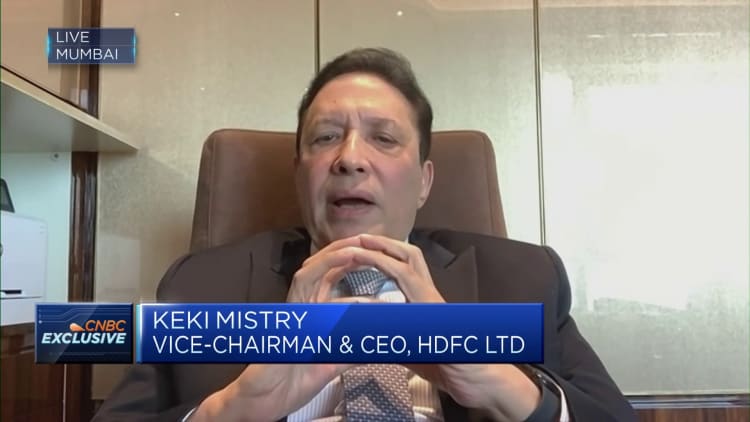India's largest private lender HDFC Bank has completed its merger with Housing Development Finance Corporation, the country's biggest mortgage lender, in a deal that pits the new entity against the world's largest banks.
The merger took effect on July 1, following shareholder and regulatory approvals.
The merged entity will be the world's fourth largest bank by market cap in the world — behind JPMorgan Chase, Industrial and Commercial Bank of China and Bank of America, said Soumya Rajan, CEO and founder of Mumbai-based Waterfield Advisors.
"This is a defining event in our journey and I'm confident that our combined strength will enable us to create a holistic ecosystem of financial services," Sashi Jagdishan, CEO of HDFC Bank said Friday.
"As we navigate the path ahead, we will embrace challenges as opportunities, learn from our experiences, and strive to be the benchmark of success and integrity in the financial services industry," he said in a press release.
Merger details
The merger took place on Saturday, about 15 months after the deal was first announced.
HDFC Bank announced in April last year that it will be acquiring its parent company Housing Development Finance Corporation, the largest home financing lender in India, in a $40 billion all-stock deal.
The merger was carried out efficiently due to the "common culture" that both companies have, said Nilesh Shah, managing director at Kotak Mahindra Asset Management.
HDFC shareholders will receive 42 shares of HDFC Bank for every 25 shares they own, and HDFC will cease operations on the Indian stock market on 13 July.
The new entity now holds a market cap of approximately $172 billion, Rajan said, adding it will become India's second most valued company by market cap after Reliance Industries.
Synergies
"These two powerhouses coming together should make a material impact in growth and expanding the client base in the days to come," Shah told CNBC.
"So for them, one plus one should become 11 and not two or three. They need to leverage these synergies to create even a better organization than what has already been created," he said.
In a presentation to HDFC investors, the mortgage lender outlined synergies including access to lower funding costs, operational efficiencies and a wider distribution network for HDFC.
There will also be cross-selling opportunities as 70% of HDFC's customers do not have a banking account with HDFC Bank, according to the presentation. In addition, out of HDFC Bank's 71 million customer base, "only 5% have a mortgage from other mortgage providers and only 2% have a mortgage from HDFC."

Before the two entities merged, HDFC was the "organization that gave most people mortgages and housing loans in India, which they could never aspire to have in the past," said Rajan from Waterfield Advisors.
The merger was "inevitable," and it now gives customers access to a suite of services and a bigger distribution network, she added.
More M&A to come?
Both analysts agreed that more such mergers could be seen coming out of India.
"In this instance, you had the case of a mortgage lender, and you had a case of a pure bank, and being able to find the synergies there. Likewise, if there are other standalone entities that specialize in specific services — which could be complementary to a larger bank – I think those will start playing out as well [in a merger]," she added.
Shah said that HDFC Bank is not part of the MSCI Emerging Market Index, but may now be included.
The merger gives the new entity a "fast growing opportunity" for global investors looking to buy into India's banking sector, Shah highlighted.
"It was always a non-index bet, but despite that investors felt comfortable owning it. Being part of the index is now going to really positively bring many more new investors into HDFC Bank," Shah said.
Shares of HDFC Bank are up 4.5% year-to-date, while shares of HDFC have risen 7% in the same period, according to FactSet data.



